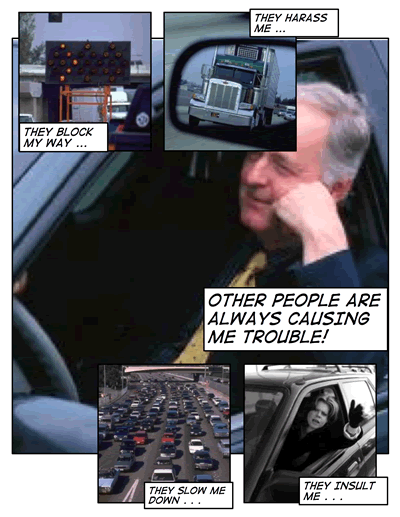Want a trouble-free day?
Here's how to get one almost every time.

One of the best ways to be able to slow down and lower your stress is to save yourself trouble, especially the kind that others so often cause you. And the best way to save yourself from that kind of trouble is to avoid causing trouble to others first. Really. You may want to believe that other people are natural assholes (some, sadly, are), but most are behaving that way because they think they have to deal with an asshole . . . you!
We all spend time and attention—usually plenty of both—focusing on the trouble and difficulties we think other people cause us. But how often do you stop to consider what trouble you cause others? Maybe someone cut you up in traffic today, or spoke to you rudely. Perhaps your boss chewed you out for some minor problem or one of your subordinates was surly and inattentive. What’s your immediate inclination? To dwell on your hurt . . . or wonder whether you might have done something to cause their response?
Mostly people don’t even notice times when they cause others discomfort or extra work. If they do, they probably excuses themselves by saying “that wasn’t what I meant” or “that was just an accident.” Push them further, and they’ll likely say, “It wasn’t such a big deal. They’re making a fuss about nothing,” or “That’s life, I guess.”
The purpose of self-reflection shouldn’t be to find excuses or indulge in sentimental navel-gazing. Our problem as humans is that we’re so often out of touch with reality. What we do, think and say is based on fantasies from our minds. We don’t deal with the real world. We’re wrapped in our flawed perceptions of what’s there. Reflection is the first step towards seeing the world as it truly is—and that includes seeing our part in the problems and difficulties others face.
Looking carefully at what you and how people around you respond do will give you more insight into how and why other people do what they do. You can never get inside their heads to understand the real balance between inner drives and outer circumstances that triggered their behavior. But you can certainly do that with your own actions.
Here’s a simple exercise taken from Gregg Krech’s book Naikan: Gratitude, Grace, and the Japanese Art of Self-Reflection
Sit quietly and ask yourself three questions:
- What have I received from others today?
- What have I contributed to others today?
- What troubles and difficulties have I caused people?
People nearly always respond as best they can to the situations in which they find themselves. Some of the response is down to them and their personalities. Most is due to the circumstances and how they understand them. Yet our human tendency is to focus on the circumstances that caused us to act badly—and so rationalize away our own thoughtless or cruel behavior—yet attribute poor behavior in others entirely to the person themselves, ignoring the circumstances—which may include, of course, our behavior which triggered their outburst. Psychologists call this Attribution Error and it’s behind many kinds of human conflict, from Road Rage (that driver cut in front of me deliberately, because he or she’s an idiot and an asshole) to war (those people have to be crushed because they’re inherently evil).
Of course, people who think that kind of thing about you or me are misguided or plain stupid. Right?
Labels: stress, trust, work/life balance







2 Comments:
Should the sentence near the end be "Psychologists *cause* this Attribution Error" or "Psychologists *call* this Attribution Error"???
Thank you for picking that up. I have now changed it.
Post a Comment
<< Home